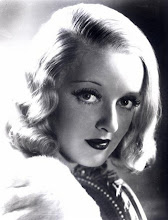I just finished watching The Public Enemies: The Golden Age Of The Gangster Film, a documentary about the Warner Brothers gangster flicks. A variety of directors, actors, and film historians whose names unfortunately flashed by too quickly for me to catch (with the notable exception of the professor here at Rowan who taught the class that first sparked my interest in classic movies) discussed the rise and fall of the gangster genre, and the legacy that continues through today.
One interesting aspect that the documentary covered was the social context of gangster films. The genre really took off during the Great Depression, because gangster characters were able to pull themselves up by their bootstraps, as the saying goes, and turn a profit even in the face of widespread poverty. To a degree, the general public emulated these characters, although it was important that every criminal "got his" in the end. Audiences were able to fantasize for the duration of the film that they too could create a more prosperous life for themselves by living outside the law, but by the end of the picture justice had been served and they could go back to their own lives content with the fact that crime doesn't pay.
There were a few real-life events that made storytelling more difficult for filmmakers in the gangster genre. First, the end of the Prohibition took the most cinematically-exciting form of crime (that is, bootlegging alcohol) away from the real gangs. Art was very slow to imitate life in this instance, as producers kept churning out films set during the Prohibition. When they did move on, they tried to adapt by blending gangster films with other genres, such as comedy and horror. When the U.S. entered World War II, gangsters in movies took on a more all-American quality, compared to the immigrant and ethnic gangsters that were originally the genre's focus. Finally, in the post-war era, the genre took on a grittier and more psychological film noir quality before burning itself out entirely. Raoul Walsh's White Heat is considered the last of the classic gangster films.
The documentary covered a lot of other interesting topics, but unfortunately I can't possibly get into all of them here (seriously, I took five Microsoft Works pages of outline-style notes). According to TCM's website, it isn't due to air again until January 10th at 4:30 in the morning, but if you happen to be the type of person who plans things that far in advance then I would definitely recommend setting your DVR (or VCR, if you're old-school like me) for it now. I found the information presented very interesting, and I'd probably watch it again. If you don't want to wait until January for another gangster fix, join me in a day or so when I'll discuss some of the gangster movies I'm watching right now.
Sources:
Public Enemies, The: The Golden Age of the Gangster Film (2008) Overview. (2008). TCM Turner Classic Movies. Retrieved October 21, 2008, from Time Warner Web site: http://www.tcm.com/tcmdb/title.jsp?stid=728304
Subscribe to:
Post Comments (Atom)


No comments:
Post a Comment